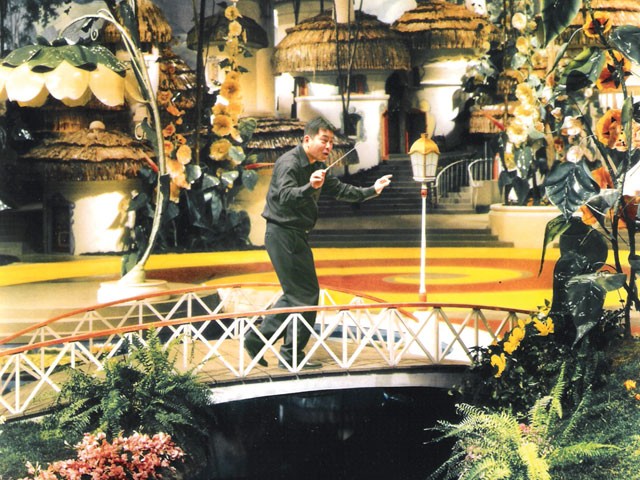If you pop The Wizard of Oz into your DVD player and then cue up The Dark Side of the Moon just right... well, the guys in Pink Floyd have always denied this, but, like, the part when the tornado approaches the farmhouse and Dorothy gets bonked on the head? That totally syncs with “The Great Gig in the Sky.”
And there’s more. (This has all been proven, man.)
That explosion at the end of “On the Run”? Toto perks up his ears at that exact moment.
And those chimes in the third song, “Time”? They start when Almira Gulch starts riding her bicycle, ringing her little bell — and when she dismounts, the chimes stop. Plus that Almira lady looks just like the Wicked Witch of the West — and how weird is that?
In 1973, though, Pink Floyd had only the four musicians (plus background singers).
This weekend, when Resident Conductor Morihiko Nakahara assembles the Spokane Symphony to play the complete score of The Wizard of Oz — while the movie itself plays on a big screen overhead — he’ll be overseeing 54 musicians in live performance.
Which is slightly more complicated.
How is Nakahara going to keep everything synced? Because he’ll have percussion to the left of him, trumpets to the right of him, and the Cowardly Lion looming up above.
“The score has a lot of timing indications, sometimes down to half a second,” Nakahara says. “Basically there are benchmarks in the score every five to 10 seconds of on-screen time. I’ll have a video monitor next to my music stand, and the monitor has a little clock in the corner. My job is to keep an eye on that clock and sync up all the benchmarks with the score.”
But what if the orchestra gets out of sync? Because the movie is not going to stop and wait just because the second violins got a little behind.
“If I need to adjust, I can do so with too much drama,” Nakahara says. “Over some of the dialogue and in some underscores, we have convenient hold and stops, similar to accompanying live singers and actors.”
Several times, there’s no underscoring at all, and the orchestra goes silent. “The clock on my monitor disappears during these moments,” Nakahara says. “Then, before we begin playing again, the clock resets with a 30-second countdown to the cue.”
Some passages, of course, are particularly complex to play. Nakahara singles out “‘The Cyclone,’ plus the whole sequence in the second half beginning with ‘The Haunted Forest’ and ‘On to the Castle Wall.’ It’s very technical, with so many transitions — and a lot of this music is really, really fast. Also, a lot of the music associated with the Wicked Witch has dissonant chords and spooky stuff.”
In an e-mail exchange, Nakahara points out some things to listen for. “The entire ‘Munchkinland Musical Sequence’ is a lot of fun,” he says. Composer Herbert Stothart “utilizes the whole orchestra, and we’ll have a chance to shine during some of the interludes while they’re dancing around onscreen. ‘If I Only Had a Brain’ has some comical brass effects like trombone slides and woodwind flourishes. And when Judy Garland sings ‘Over the Rainbow,’ there are some wonderful colors with alto flute, harp, guitar, celesta and mallet instruments.”
Some of that musical colorizing, of course, could have been done just as well by Pink Floyd. (That is, if Roger Waters had actually had The Wizard of Oz in mind during those Abbey Road recording sessions. Which he didn’t.)
But that just creates an opening for the SSO to step in and provide the musical accompaniment to a beloved movie.
Or, as Nakahara puts it, “Who wouldn’t want to accompany Judy Garland?”
“Oz with Orchestra” pairs a screening of The Wizard of Oz with live performance by the Spokane Symphony Orchestra on Saturday, Feb. 20, at 8 pm and on Sunday, Feb. 21, at 3 pm at the Fox. Tickets: $25- $52. Visit spokanesymphony. org or call 624-1200 or (800) 325-SEAT.

















